Unit 6 When was it invented? Section A (3a-3c)课件(共26张PPT)
文档属性
| 名称 | Unit 6 When was it invented? Section A (3a-3c)课件(共26张PPT) | 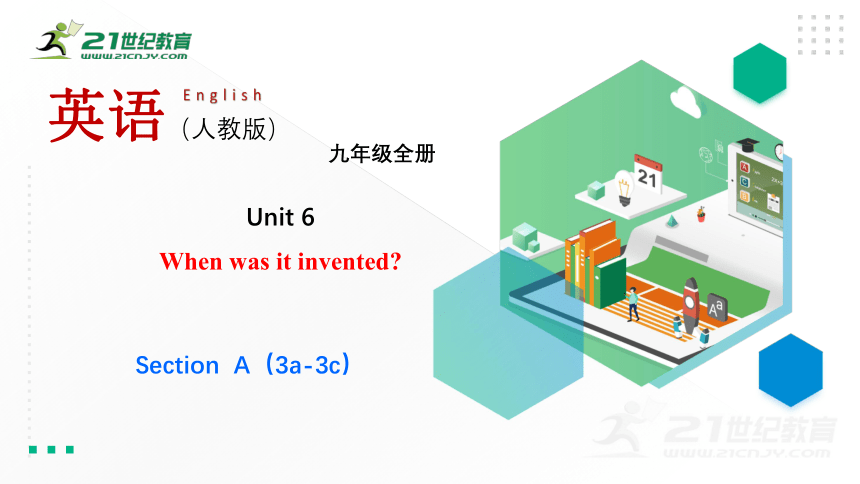 | |
| 格式 | pptx | ||
| 文件大小 | 21.1MB | ||
| 资源类型 | 试卷 | ||
| 版本资源 | 人教新目标(Go for it)版 | ||
| 科目 | 英语 | ||
| 更新时间 | 2022-07-09 18:03:12 | ||
图片预览

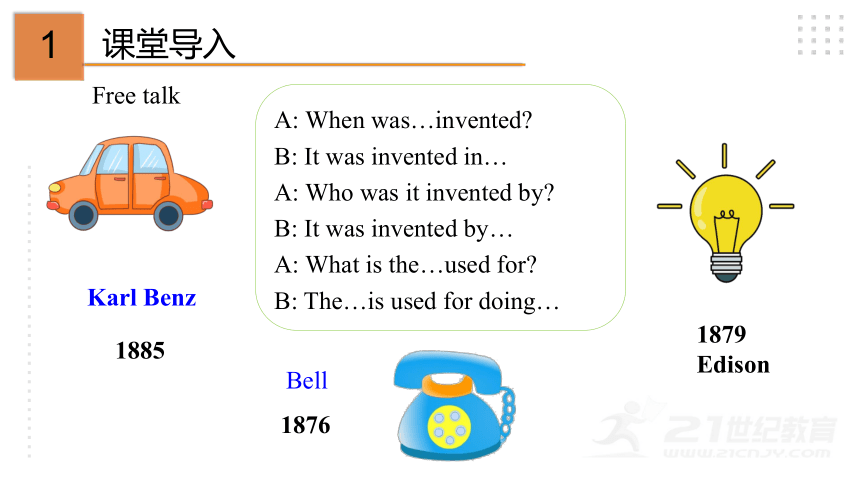
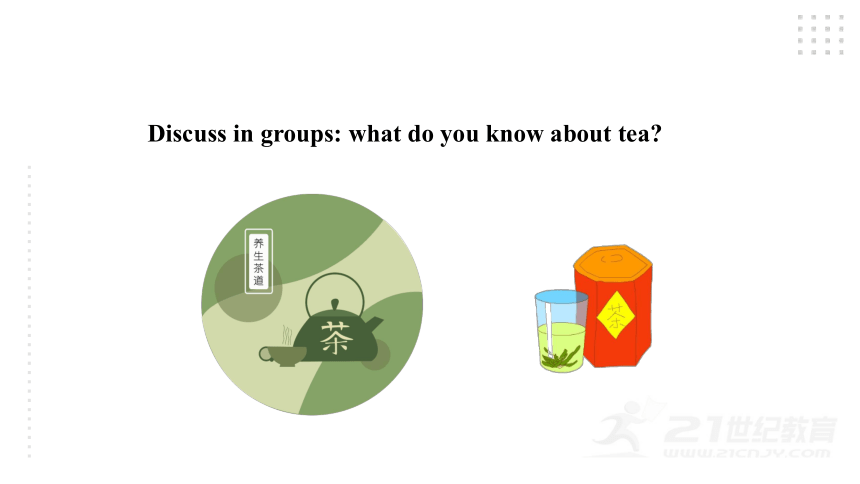
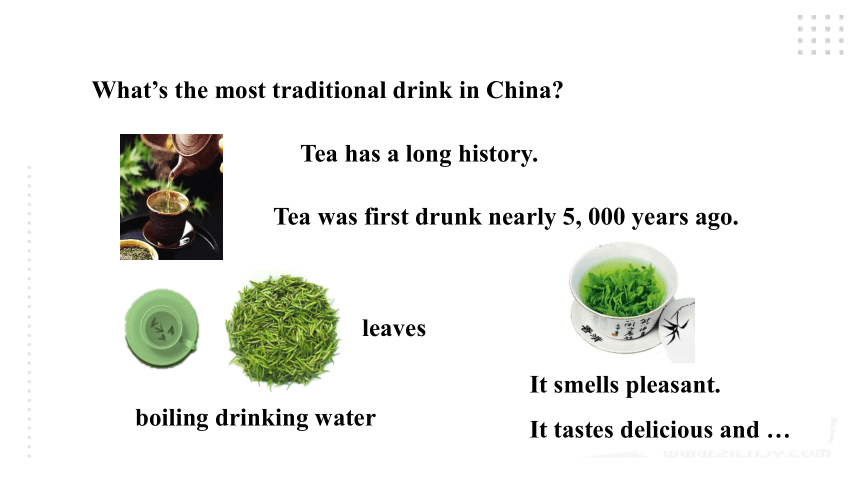
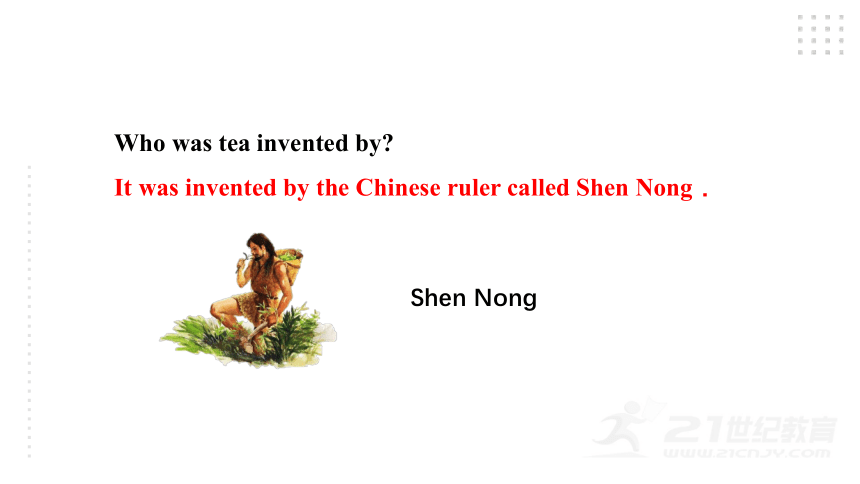
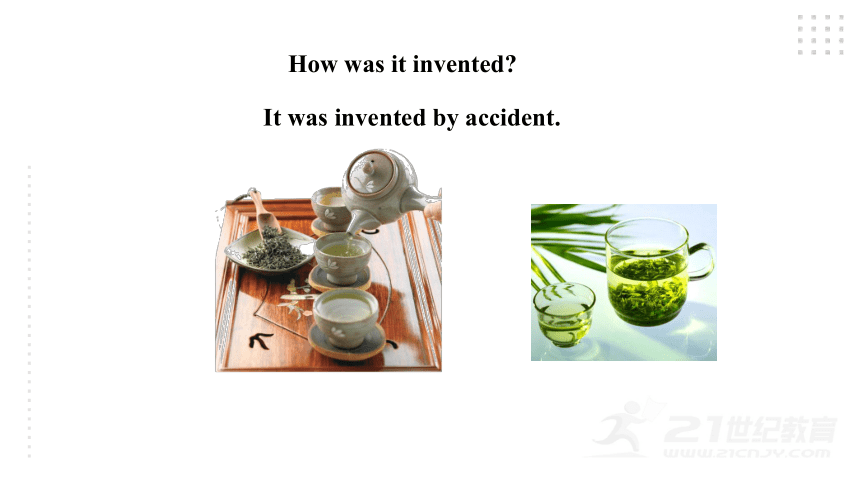
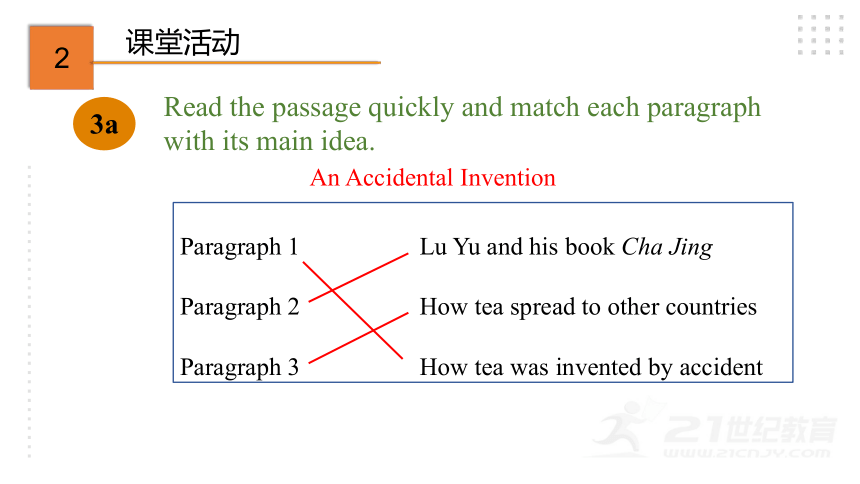
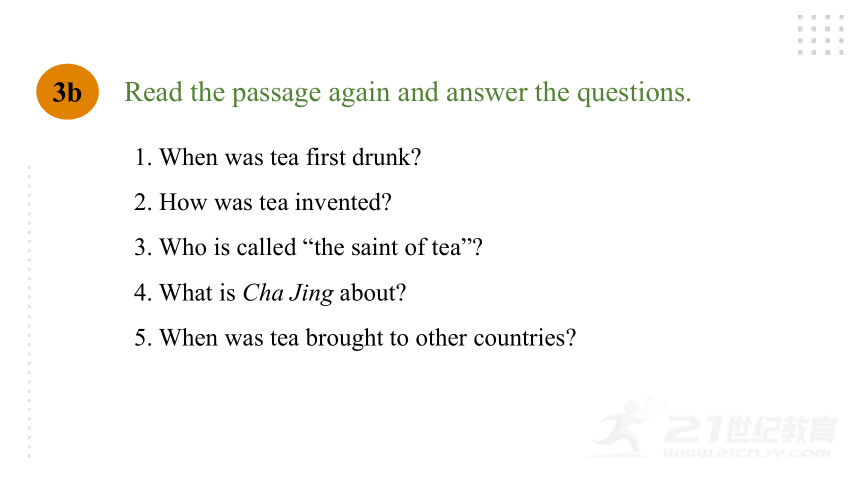
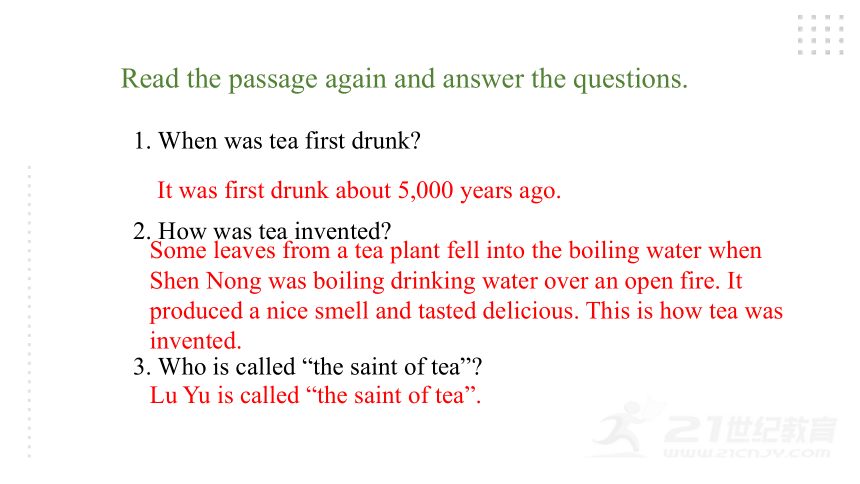
文档简介
(共26张PPT)
英语(人教版)
九年级全册
English
Unit 6
When was it invented
Section A(3a-3c)
Karl Benz
1885
1876
Bell
A: When was…invented
B: It was invented in…
A: Who was it invented by
B: It was invented by…
A: What is the…used for
B: The…is used for doing…
1879
Edison
Free talk
1
课堂导入
Discuss in groups: what do you know about tea
What’s the most traditional drink in China
Tea has a long history.
Tea was first drunk nearly 5, 000 years ago.
boiling drinking water
leaves
It smells pleasant.
It tastes delicious and …
Who was tea invented by
It was invented by the Chinese ruler called Shen Nong.
Shen Nong
How was it invented
It was invented by accident.
Paragraph 1 Lu Yu and his book Cha Jing
Paragraph 2 How tea spread to other countries
Paragraph 3 How tea was invented by accident
3a
Read the passage quickly and match each paragraph with its main idea.
An Accidental Invention
2
课堂活动
Read the passage again and answer the questions.
1. When was tea first drunk
2. How was tea invented
3. Who is called “the saint of tea”
4. What is Cha Jing about
5. When was tea brought to other countries
3b
Read the passage again and answer the questions.
1. When was tea first drunk
2. How was tea invented
3. Who is called “the saint of tea”
It was first drunk about 5,000 years ago.
Some leaves from a tea plant fell into the boiling water when Shen Nong was boiling drinking water over an open fire. It produced a nice smell and tasted delicious. This is how tea was invented.
Lu Yu is called “the saint of tea”.
Read the passage again and answer the questions.
4. What is Cha Jing about
5. When was tea brought to other countries
It describes how tea plants were grown and used to make tea.
It was brought to Korea and Japan during the 6th and 7th centuries
and to England around 1600.
Did you know that tea, the most popular drink in the world(after water), was invented by accident Many people believe that tea was first drunk about 5,000 years ago. It is said that a Chinese ruler called Shen Nong was the first to discover tea as a drink. One day Shen Nong was boiling drinking water over an open fire. Some leaves from a tea plant fell into the water and remained there for some time. It produced a nice smell so he tasted the brown water. It was quite delicious, and so, one of the world’s favorite drinks was invented.
An Accidental Invention
n. 统治者;支配者
据说
boil v. 煮沸;烧开
remain v. 剩余
n.气味
Read aloud
A few thousand years later, Lu Yu, “the saint of tea”, mentioned Shen Nong in his book Cha Jing. The book describes how tea plants were grown and used to make tea. It also discusses where the finest tea leaves were produced and what kinds of water were used.
It is believed that tea was brought to Korea and Japan during the 6th and 7th centuries. In England, tea didn’t appear until around 1660, but in less than 100 years, it had become the national drink. The tea trade from China to Western countries took place in the 19th century. This helped to spread the popularity of tea and the tea plant to more places around the world. Even though many people now know about tea culture, the Chinese are without doubt the ones who best understand the nature of tea.
n. 贸易;交易
adj. 国家的;民族的
n. 饮品
by accident 偶然;意外地
1. How tea was invented by accident(教材P43 3a)
Language points
by accident相当于by chance,通常在句中作状语,也可以作表语。其反义短语是on
purpose“故意地”。
This piece of music has a lasting value though it is made up by accident.
It is said that ...据说……
2. It is said that a Chinese ruler called Shen Nong ...(教材P43 3a)
It is said that...中的It作形式主语,真正的主语是that引导的从句。该结构相当于
“People say that…“。
It is said that she works as a director.
与此类似的结构还有:
It is believed that… 人们认为……
It is reported that… 据报道……
It is (well)known that… 众所周知……
boil v. 煮沸;烧开
3. One day Shen Nong was boiling drinking water …(教材P43 3a)
boil在此处作及物动词;它也可作不及物动词,其后接温度时要用介词at。
boil 作动词,还可意为“(用开水)煮(食物)”。
Water usually boils at 100℃.
Can you help me boil dumplings
boiled water
boiling water
开水(形容水被烧开的状态)
沸水(形容水正在沸腾的状态)
Remain v. 保持不变;剩余
4. … and remained there for some time. (教材P43 3a)
(1)remain在此处作不及物动词,意为“剩余,遗留,继续存在”。
There are only ten minutes remaining.
(2)remain作不及物动词,还可表示“逗留;不离去”。
The plane remained on the ground.
smell n.气味 v. 发出......气味;闻到
5. It produced a nice smell …(教材P43 3a)
(1)smell在此处作可数名词,意为“气味”。smell还可作不可数名词,意为“嗅觉”。
The flower has a sweet smell.
(2)smell还可作系动词,意为“有......气味,发出......气味”,后接形容词作表语。
The cheese cake smells so good that I can’t wait to eat it.
(3)smell也可作及物动词,意为“闻到,嗅到(气味)”。
I smelt something burning.
national adj. 国家的;民族的
6. … it had become the national drink.(教材P43 3a)
national作形容词,由“nation(n. 国家;民族) +-al(形容词后缀)”构成。
These buildings are part of our national heritage.
trade n. 贸易;交易 v.做买卖;从事贸易
7. The tea trade from China to Western countries took place in the 19th
century. (教材P43 3a)
(1)trade在此处作名词,意为“贸易;交易”,此时常用作不可数名词。
Trade between the two countries has increased.
(2)trade还可作动词,意为“做买卖;从事贸易”。常用结构:trade (in sth. ) with sb.与某人交易(某物)。
They had years of experience of trading with the West.
take place 发生;举行
7. The tea trade from China to Western countries took place in the 19th
century. (教材P43 3a)
take place为不及物动词短语,不能用于被动语态。指根据安排或计划发生,含有事先预料或计划的意思。
The 2022 Winter Olympics will take place in Beijing, China.
happen意为“发生”,为不及物动词,不能用于被动语态。指具体客观事件的发生,有偶然性,未能预见。
A car accident happened last night.
without doubt 毫无疑问;的确
8. … the Chinese are without doubt the ones who best understand the
nature of tea.(教材P43 3a)
without doubt可与there is no doubt that进行同义句转换。其中doubt作名词,意为“疑问;疑惑” 。
He is without doubt the best teacher in our school.
There is no doubt that he is the best teacher in our school.
Complete the sentences with the correct forms of the verbs in the box.
1. One of the world’s favorite drinks was _________ by accident.
2. Tea was first ________ by Shen Nong 5,000 years ago.
3. A nice smell was _________ when the tea leaves dropped into the hot water.
4. Tea was ________ to Korea and Japan during the 6th and 7th centuries.
5. Tea is now ________ between many different countries.
invented
3c
drunk
produced
brought
traded
invent drink bring produce trade
注意drink和trade的词性
3
课堂小结
1.We have learnt how to use passive voice in the text.
2.We have learnt some new words and expressions
involving the text.
You can’t __________ (翻译)every English word into Chinese, and it’s not good for your English study.
We were talking on the phone. _________ (sudden), the line went dead.
Look! The water in the pot is b_________.
Thousands of people go to Tian’anmen Square and watch the _________ ______ (国旗)go up every morning.
“Are you sure you can work out the problem yourself ” Peter asked me in d_______.
translate
oiling
Suddenly
national
oubt
一、根据汉语、首字母或英文提示填空
flag
4
课堂训练
二、从方框中选择合适的单词,并用其适当形式完成短文。
When feeling tired, lots of people are used to drinking coffee. It is without_______that coffee is a popular drink all over the world. Coffee has been a part of people's life for thousands of years. People drink coffee with great_________But do you know how it________
Many centuries ago, there was a farmer called Kaldi in Arabia. One day, he was watching his sheep. All of ________, he noticed that his sheep became very active after eating the red fruits from a plant. So he ate some. To his surprise, he didn't feel tired anymore. He picked some fruits in a_______and sent them to a monk (修道士) . The man told him about that. The monk also ate that fruit and he had the same experience. The monk ground (研磨) the red fruits and put them in_________water and then served to the other people. They felt fresh
___________drinking it. In fact, the red fruit was the coffee fruit.
Coffee drinking________ began in Arabia. In the 17th century it________to Britain. In 1650, the first coffee house of the world was opened in England.
after please spread suddenly basket daily invent boil one doubt
doubt daily pleasure was invented sudden basket boiling after first spread
https://www.21cnjy.com/help/help_extract.php
英语(人教版)
九年级全册
English
Unit 6
When was it invented
Section A(3a-3c)
Karl Benz
1885
1876
Bell
A: When was…invented
B: It was invented in…
A: Who was it invented by
B: It was invented by…
A: What is the…used for
B: The…is used for doing…
1879
Edison
Free talk
1
课堂导入
Discuss in groups: what do you know about tea
What’s the most traditional drink in China
Tea has a long history.
Tea was first drunk nearly 5, 000 years ago.
boiling drinking water
leaves
It smells pleasant.
It tastes delicious and …
Who was tea invented by
It was invented by the Chinese ruler called Shen Nong.
Shen Nong
How was it invented
It was invented by accident.
Paragraph 1 Lu Yu and his book Cha Jing
Paragraph 2 How tea spread to other countries
Paragraph 3 How tea was invented by accident
3a
Read the passage quickly and match each paragraph with its main idea.
An Accidental Invention
2
课堂活动
Read the passage again and answer the questions.
1. When was tea first drunk
2. How was tea invented
3. Who is called “the saint of tea”
4. What is Cha Jing about
5. When was tea brought to other countries
3b
Read the passage again and answer the questions.
1. When was tea first drunk
2. How was tea invented
3. Who is called “the saint of tea”
It was first drunk about 5,000 years ago.
Some leaves from a tea plant fell into the boiling water when Shen Nong was boiling drinking water over an open fire. It produced a nice smell and tasted delicious. This is how tea was invented.
Lu Yu is called “the saint of tea”.
Read the passage again and answer the questions.
4. What is Cha Jing about
5. When was tea brought to other countries
It describes how tea plants were grown and used to make tea.
It was brought to Korea and Japan during the 6th and 7th centuries
and to England around 1600.
Did you know that tea, the most popular drink in the world(after water), was invented by accident Many people believe that tea was first drunk about 5,000 years ago. It is said that a Chinese ruler called Shen Nong was the first to discover tea as a drink. One day Shen Nong was boiling drinking water over an open fire. Some leaves from a tea plant fell into the water and remained there for some time. It produced a nice smell so he tasted the brown water. It was quite delicious, and so, one of the world’s favorite drinks was invented.
An Accidental Invention
n. 统治者;支配者
据说
boil v. 煮沸;烧开
remain v. 剩余
n.气味
Read aloud
A few thousand years later, Lu Yu, “the saint of tea”, mentioned Shen Nong in his book Cha Jing. The book describes how tea plants were grown and used to make tea. It also discusses where the finest tea leaves were produced and what kinds of water were used.
It is believed that tea was brought to Korea and Japan during the 6th and 7th centuries. In England, tea didn’t appear until around 1660, but in less than 100 years, it had become the national drink. The tea trade from China to Western countries took place in the 19th century. This helped to spread the popularity of tea and the tea plant to more places around the world. Even though many people now know about tea culture, the Chinese are without doubt the ones who best understand the nature of tea.
n. 贸易;交易
adj. 国家的;民族的
n. 饮品
by accident 偶然;意外地
1. How tea was invented by accident(教材P43 3a)
Language points
by accident相当于by chance,通常在句中作状语,也可以作表语。其反义短语是on
purpose“故意地”。
This piece of music has a lasting value though it is made up by accident.
It is said that ...据说……
2. It is said that a Chinese ruler called Shen Nong ...(教材P43 3a)
It is said that...中的It作形式主语,真正的主语是that引导的从句。该结构相当于
“People say that…“。
It is said that she works as a director.
与此类似的结构还有:
It is believed that… 人们认为……
It is reported that… 据报道……
It is (well)known that… 众所周知……
boil v. 煮沸;烧开
3. One day Shen Nong was boiling drinking water …(教材P43 3a)
boil在此处作及物动词;它也可作不及物动词,其后接温度时要用介词at。
boil 作动词,还可意为“(用开水)煮(食物)”。
Water usually boils at 100℃.
Can you help me boil dumplings
boiled water
boiling water
开水(形容水被烧开的状态)
沸水(形容水正在沸腾的状态)
Remain v. 保持不变;剩余
4. … and remained there for some time. (教材P43 3a)
(1)remain在此处作不及物动词,意为“剩余,遗留,继续存在”。
There are only ten minutes remaining.
(2)remain作不及物动词,还可表示“逗留;不离去”。
The plane remained on the ground.
smell n.气味 v. 发出......气味;闻到
5. It produced a nice smell …(教材P43 3a)
(1)smell在此处作可数名词,意为“气味”。smell还可作不可数名词,意为“嗅觉”。
The flower has a sweet smell.
(2)smell还可作系动词,意为“有......气味,发出......气味”,后接形容词作表语。
The cheese cake smells so good that I can’t wait to eat it.
(3)smell也可作及物动词,意为“闻到,嗅到(气味)”。
I smelt something burning.
national adj. 国家的;民族的
6. … it had become the national drink.(教材P43 3a)
national作形容词,由“nation(n. 国家;民族) +-al(形容词后缀)”构成。
These buildings are part of our national heritage.
trade n. 贸易;交易 v.做买卖;从事贸易
7. The tea trade from China to Western countries took place in the 19th
century. (教材P43 3a)
(1)trade在此处作名词,意为“贸易;交易”,此时常用作不可数名词。
Trade between the two countries has increased.
(2)trade还可作动词,意为“做买卖;从事贸易”。常用结构:trade (in sth. ) with sb.与某人交易(某物)。
They had years of experience of trading with the West.
take place 发生;举行
7. The tea trade from China to Western countries took place in the 19th
century. (教材P43 3a)
take place为不及物动词短语,不能用于被动语态。指根据安排或计划发生,含有事先预料或计划的意思。
The 2022 Winter Olympics will take place in Beijing, China.
happen意为“发生”,为不及物动词,不能用于被动语态。指具体客观事件的发生,有偶然性,未能预见。
A car accident happened last night.
without doubt 毫无疑问;的确
8. … the Chinese are without doubt the ones who best understand the
nature of tea.(教材P43 3a)
without doubt可与there is no doubt that进行同义句转换。其中doubt作名词,意为“疑问;疑惑” 。
He is without doubt the best teacher in our school.
There is no doubt that he is the best teacher in our school.
Complete the sentences with the correct forms of the verbs in the box.
1. One of the world’s favorite drinks was _________ by accident.
2. Tea was first ________ by Shen Nong 5,000 years ago.
3. A nice smell was _________ when the tea leaves dropped into the hot water.
4. Tea was ________ to Korea and Japan during the 6th and 7th centuries.
5. Tea is now ________ between many different countries.
invented
3c
drunk
produced
brought
traded
invent drink bring produce trade
注意drink和trade的词性
3
课堂小结
1.We have learnt how to use passive voice in the text.
2.We have learnt some new words and expressions
involving the text.
You can’t __________ (翻译)every English word into Chinese, and it’s not good for your English study.
We were talking on the phone. _________ (sudden), the line went dead.
Look! The water in the pot is b_________.
Thousands of people go to Tian’anmen Square and watch the _________ ______ (国旗)go up every morning.
“Are you sure you can work out the problem yourself ” Peter asked me in d_______.
translate
oiling
Suddenly
national
oubt
一、根据汉语、首字母或英文提示填空
flag
4
课堂训练
二、从方框中选择合适的单词,并用其适当形式完成短文。
When feeling tired, lots of people are used to drinking coffee. It is without_______that coffee is a popular drink all over the world. Coffee has been a part of people's life for thousands of years. People drink coffee with great_________But do you know how it________
Many centuries ago, there was a farmer called Kaldi in Arabia. One day, he was watching his sheep. All of ________, he noticed that his sheep became very active after eating the red fruits from a plant. So he ate some. To his surprise, he didn't feel tired anymore. He picked some fruits in a_______and sent them to a monk (修道士) . The man told him about that. The monk also ate that fruit and he had the same experience. The monk ground (研磨) the red fruits and put them in_________water and then served to the other people. They felt fresh
___________drinking it. In fact, the red fruit was the coffee fruit.
Coffee drinking________ began in Arabia. In the 17th century it________to Britain. In 1650, the first coffee house of the world was opened in England.
after please spread suddenly basket daily invent boil one doubt
doubt daily pleasure was invented sudden basket boiling after first spread
https://www.21cnjy.com/help/help_extract.php
同课章节目录
- Unit 1 How can we become good learners.
- Section A
- Section B
- Unit 2 I think that mooncakes are delicious!
- Section A
- Section B
- Unit 3 Could you please tell me where the restroom
- Section A
- Section B
- Unit 4 I used to be afraid of the dark.
- Section A
- Section B
- Unit 5 What are the shirts made of?
- Section A
- Section B
- Review of Units 1-5
- Unit 6 When was it invented?
- Section A
- Section B
- Unit 7 Teenagers should be allowed to choose their
- Section A
- Section B
- Unit 8 It must belong to Carla.
- Section A
- Section B
- Unit 9 I like music that I can dance to.
- Section A
- Section B
- Unit 10 You're supposed to shake hands.
- Section A
- Section B
- Review of Units 6-10
- Unit 11 Sad movies make me cry.
- Section A
- Section B
- Unit 12 Life is full of the unexpected
- Section A
- Section B
- Unit 13 We're trying to save the earth!
- Section A
- Section B
- Unit 14 I remember meeting all of you in Grade 7.
- Section A
- Section B
- Review of Units 11-14
